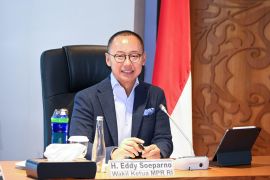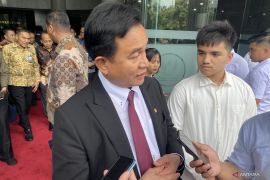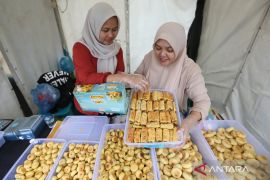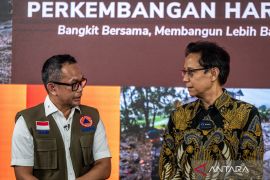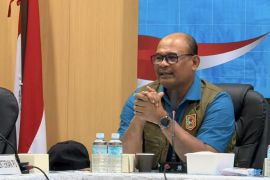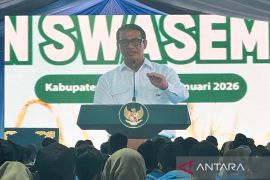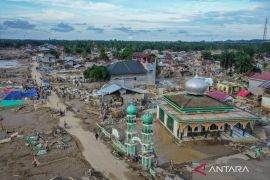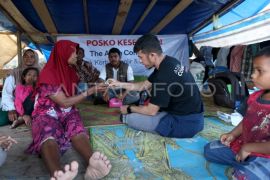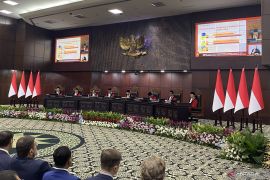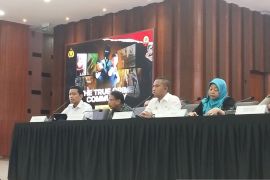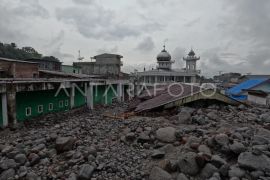Distribution of election materials, such as ballot papers, ballot boxes and ink, was a challenge for the worlds largest archipelago consisting of thousands of islands.
Election officers, with the assistance of the Indonesian military personnel, had used air, water and land transportation to deliver the supplies as the General Elections Commission (KPU) had set the deadline of April 8 as the date by which all materials must arrive in polling stations.
In a number of provinces, including Jakarta and Southeast Sulawesi, the distribution of ballot papers, ballot boxes and election ink was 100 percent.
However, on Papua Island, which was located in the eastern most part of Indonesia and was mostly mountainous with steep slopes and jagged peaks, election officers had struggled to distribute the election material supplies to remote villages located in mountain tops, thick forests and isolated isles.
Besides the Indonesian army that had deployed helicopters to help distribute the supplies in Papua Province, gold and copper mining company PT Freeport Indonesia had also provided an Airfast helicopter to distribute the election supplies to three kampongs located in the remote areas of Mimika District, Papua.
The three isolated kampongs were Hoeya, Jinoni and Puti, commissioner of the Mimika general elections committee (KPU) Agus Hugo Krey said in Timika on Tuesday, April 8.
"We thank PT Freeport for helping in the distribution of the election logistics supplies to several remote areas in Mimika," Krey noted.
In Mimika District, the election logistics supplies were successfully distributed to Remote West Mimika, Agimuga, Jita, Tembagapura, Central West Mimika, West Mimika, Central Mimika, East Mimika, Remote East Mimika and part of Jila.
Papuas KPU Chairman Adam Arisoy, however, announced in Jayapura on April 8 that the legislative election in 44 sub-districts located in Yahukimo, Nduga and Lanny Jaya districts were likely to be delayed, due to the late arrival of ballots and other supplies in those areas.
Of the 44 sub-districts, 35 were located in Yahukimo, eight in Nduga and one in Lanny Jaya.
Bad weather was one of the factors that hampered the supply distribution, which can mostly only be carried out by aircraft.
The local KPU planned to write a letter to the central KPU to ask for permission to delay the parliamentary elections, he said.
Previously, commander of the Cenderawasih Military Regional Command XVII Major General Christian Zebua said he had deployed a helicopter to help distribute the ballots to remote areas of Yahukimo, Nduga and Lanny Jaya, but the efforts were hampered by weather and geographical factors.
The distribution of ballots for the legislative elections to the three districts in Papua was hampered by bad weather and difficult geographical condition, he remarked.
Chief of Papua Police Inspector General Tito Karnavian said in Jayapura on April 8 efforts were being made to dispatch the ballots to the three remote districts by using various means of transport.
"Hopefully, the distribution will be carried out today," he added.
Meanwhile, the election supplies had arrived in most parts of Papua, including in Jayapura District. The number of eligible voters in Jayapura District was 114,537. The district had 348 polling stations and four electoral areas.
Jayapura District chief Mathius Awoitauw had urged every eligible voter in the district to exercise his or her right to cast a vote in the election.
"Everybody must and was obliged to come to the polling stations," he said, adding that "The election was held once in five years, so it would be a pity if we didnt use our rights to vote."
By participating in the elections, the people of Jayapura would help make the districts development a success. "We should not let our votes be misused by irresponsible people," he added.
Papua Communion of Churches Chairman Reverend Lipius Biniluk recently said all religious people in Papua must vote during Wednesdays legislative election.
"Those who claim to be religious and refuse to vote were irresponsible," he stated. Biniluk explained that religious people had responsibilities and the right to vote in the elections without pressure from some parties.
Indonesia will hold legislative elections on April 9 and presidential elections on July 9, 2014. This year, 15 political parties, of which 12 are national and three are local, were participating in the elections.
In the parliamentary elections, some 6,607 candidates were contesting for 560 seats in the House of Representatives (DPR). In addition, there will be election to 132 seats of the Regional Representatives Council (DPD) at the national level, 2,112 of the provincial parliamentary (DPRD I) seats and 16,895 seats for the district/municipality-level legislative assemblies (DPRD II).(*)
Reporter: Fardah
Editor: Heru Purwanto
Copyright © ANTARA 2014
